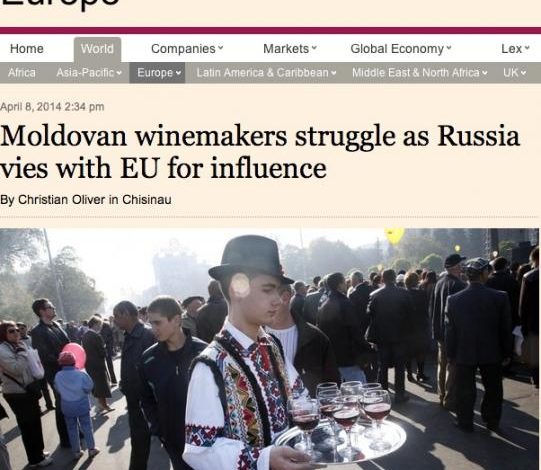Financial Times: Moldovan winemakers struggle as Russia vies with EU for influence

For generations, Russian drinkers such as Gagarin were the biggest consumers of Moldovan wine. In recent years, however, banning imports of the country’s wine has been the Kremlin’s weapon of choice in its battle to deter Moldova from establishing deeper political and commercial integration with the EU.
The latest ban on the important industry came into force in September amid Russian claims that Moldovan wine contained chemical contaminants. Moldovan politicians and vintners have no doubt that the embargo is political.
The ban has rekindled bitter memories of a 2006 Russian embargo in which more than 100 wineries collapsed and Europe’s poorest country lost about $200m in sales. “The only solution is to diversify, to build a quality product that will generate demand” outside Russia, said Artur Marin, commercial director of Bostavan, one of Moldova’s leading wineries.
Moves to improve quality and open up new markets in the EU and China reflect the broader ambitions of Moldova’s 3.5m people.
Iurie Leanca, prime minister, said 29 per cent of wine exports were destined for Russia at the time of September’s embargo, compared with 60 per cent in 2006. New industries have also emerged in recent years, including German and Austrian-financed plants to make cables and car parts to supply factories in the EU. Some Moldovan farmers have even started rearing snails for French tables.
This shift from Russia is visible across the economy. In 2001, about 60 per cent of all Moldovan exports were destined for former Soviet states, while slightly more than 30 per cent went to the EU. Today, 48 per cent of exports go to the EU, while 39 per cent go to the Commonwealth of Independent States of former Soviet republics. Trade with Romania now surpasses that with Russia.
Moldova’s government has been keen to further increase this by signing a trade and association agreement with the EU by June. A deal has already been reached to liberalise wine exports and to allow Moldovans to gain visa-free access to the EU by the end of April.
Yet the planned EU accord has sparked fury in Moscow, which wants to build a rival trade alliance to the one being offered by the EU – a clear echo of the dispute that led to the current crisis in Ukraine.
Moldovan winemakers have been succcesful in raising exports to countries such as Poland, Czech Republic and the Baltic states, where its national brand is better known. Yet there is no disguising the wine embargo is painful. The EU accounts for just 15 per cent of Moldova’s wine exports.
Mr Leanca insists Moldova must seek to convince Moscow that an EU deal is compatible with trade with Russia, rather than a threat. “The [EU deal] does not contradict our good relations with eastern countries, including Russia,” Mr Leanca told the Financial Times.
The problem for the prime minister is that Moscow’s view cannot be dismissed easily. Virtually all of its gas comes from Russia. The country is also heavily dependent on remittances, almost 70 per cent of which come from Moldovans working in Russia.
For Moldova’s winemakers, there are additional structural problems. Many vines are grown in small, uncommercial plots – a legacy of the programme that broke up Soviet-era co-operatives – which has made it hard to produce wines of a consistent quality. “Moldova will not produce a Bordeaux or a Toscana; we have to find our niche,” admitted Constantin Sirghi, director-general of the Romanesti winery.
Mr Sirghi called on Moldova to adopt aspects of the co-operative model used in part of western Europe and New Zealand, which allows smaller winegrowers to club together for financing and equipment.
More broadly, Moldova’s passage towards the EU will require greater investment in infrastructure – roads are often just dirt tracks – as well as tackling other issues such as weak governance and corruption.
Large winery owners often find that they have to act as a social security net for workers whose family members need medical treatment. Businesses also face a threat from racketeers, sometimes from people in positions of authority who use violence to extort money.
Mr Leanca said faith in the judicial system ran at “0.01 per cent” but added that greater integration with EU “values and standards” was the antidote. “Our fundamental objective is to join the European Union,” he said.
Yet Mr Marin of Bostavan admitted that even a deal with the EU would make limited practical difference for Moldovan vintners. “There are no empty shelves waiting for Moldova to come,” he said.
ft.com
Fiți la curent cu ultimele noutăți. Urmărește TIMPUL pe Google News și Telegram!
